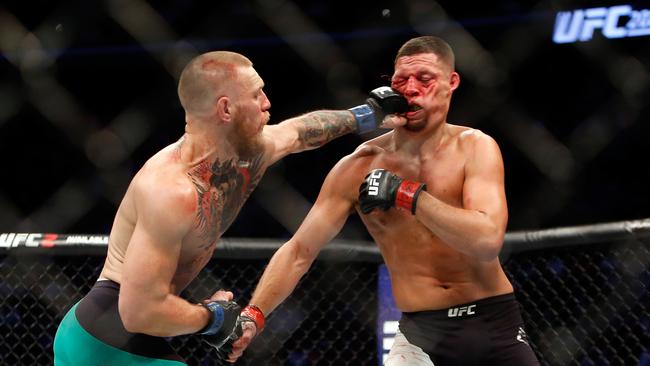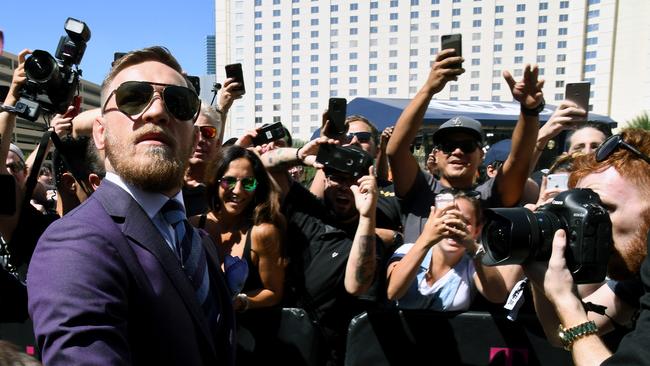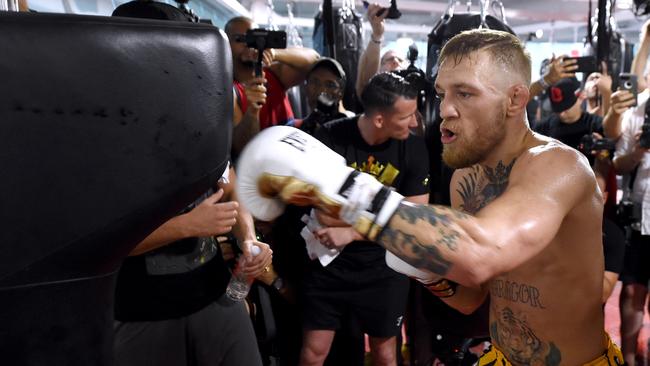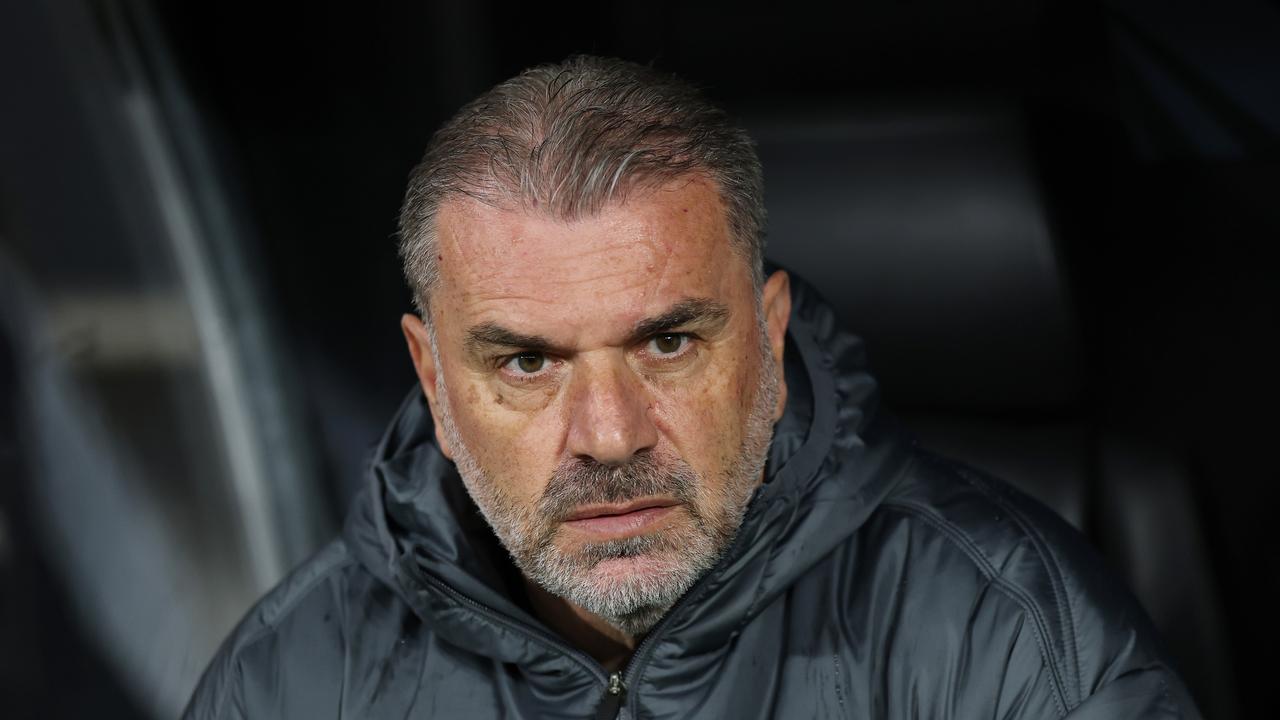McGregor vs Mayweather: from plumber to prime time
Just how did an Irish plumber-turned-mixed-martial-arts-star find himself in the same ring as boxing legend Floyd Mayweather?

They are calling it the biggest fight of the decade. They are calling it the biggest mismatch in boxing history.
They are calling him the most gifted all-round boxer of his generation. They are calling him a stooge, a no-hoper.
On Sunday, at the T-Mobile Arena in Paradise, Nevada, Floyd Mayweather and Conor McGregor will collide, and so too will hype and cynicism. It is a sporting mega-event, a licence to print money, a moral tangle, a cross-sport zygote, a social media-era spectacle. It is all these things at once and at the eye of this swirling maelstrom of contradictions is an Irish plumber-turned-fighting superstar, a man who has somehow become an icon without being a household name.
• McGregor v Mayweather: fight guide
• How McGregor can triumph
Who is Conor McGregor; what is UFC, the arena that forged his fame; and how did someone who has never been in a professional boxing match in his life find himself in a ring with arguably the greatest welterweight of all?
“The main reason [that this fight is happening] is because Floyd Mayweather needs someone like Conor McGregor to sell this event,” says Dan Hardy, a former UFC fighter and Sky Sports analyst.
“There isn’t a boxer on the planet who you could put in there with Mayweather and it’s going to sell like McGregor — because we’ve seen it 49 times before. What we want to see is something new, something different, and that’s what Conor McGregor is: he’s the unknown.”
McGregor, 29, hasn’t set foot in a boxing ring since his teenage years in the Dublin suburbs. At the age of 12, he walked into Crumlin Boxing Club and began training under Phil Sutcliffe, who represented Ireland at two Olympics. McGregor was a promising southpaw. But after a few years, at about the same time that he started a plumbing apprenticeship, another sport began to turn his head and offer a more compelling escape route from his humdrum, blue-collar existence. That sport was mixed martial arts, or MMA.

Mixed martial arts is, as the name suggests, a fusion of several different combat sports, among them boxing, wrestling, karate, taekwondo and Brazilian jiujitsu. “It’s incredibly complicated,” Hardy explains. “With boxing, it’s a real art to be able to master fist-fighting, but then you add in the art of kicking, clinch work, elbows and knees, and then wrestling, which is one of the most complicated sports you’ll ever try — there are so many small techniques and nuances — and then you add in striking, which changes it again. Basically, the fewer rules there are, the more levels of the sport you have to understand, and with MMA being such a limited-rules sport, it really opens up the styles of fighting for interpretation.”
MMA grew out of the Brazilian combat art of “vale tudo”, which translates as “anything goes” or “no holds barred”, when it migrated to American gyms in the late 1980s and early 1990s. This is the other key point about the sport: MMA is, as Hardy puts it, “as close to a real fight as you can get in a sporting environment”. The early days of organised MMA were brutal, with no gloves, no weight classes and no rules; John McCain, the senior US senator, denounced it as “human cockfighting”.
But in the early 2000s, the Ultimate Fighting Championship (UFC), the sport’s totemic organisation and shopfront, began to clean up MMA and make the product more palatable. It created a unified rule book based on the Olympic rules of freestyle and Greco-Roman wrestling, boxing, taekwondo and judo. It introduced eight weight categories, and latterly, an anti-doping program that has been described as the most stringent in any sport. And crucially, unlike boxing, the UFC effectively has a monopoly on the sport that allows it to dictate which fighters face each other.

McGregor, who stands to make an estimated $100m out of Saturday night, is the first genuine superstar produced by this newly repackaged and regulated sport. After making his MMA debut in 2008, McGregor won two titles at the sport’s second-tier Cage Warriors level in 2012 and was signed to the UFC the following year. In 2015, in the UFC featherweight title fight, he knocked out Jose Aldo in 13 seconds. Last year, upon defeating Eddie Alvarez, he became the first fighter to hold UFC titles in two different weight categories simultaneously. For the Alvarez bout, McGregor’s most recent in the UFC, the Irishman weighed in at 154.4lb or 70kg while Mayweather, who last boxed in September, weighed in at 66.2kg for his points victory over Andre Berto. McGregor, at 5ft 8in, also has the height advantage over the 5ft 7in Mayweather in what is a non-title fight made at light-middleweight. At 29, McGregor also has youth on his side against the 40-year-old Mayweather.
“He’s a fantastic fighter, absolutely exceptional,” Hardy says of McGregor. “His understanding of range, of timing, of speed, his ability to read an opponent and to set traps for them and to capitalise on mistakes that they make, is almost unparalleled in the sport.”
That, though, is only half the story of McGregor’s success. Like the other fight game, MMA’s selling power depends as much on loose lips as fast fists, and in a crowded realm, McGregor’s audacious rhetoric and gold-plated charisma have thrust him to the forefront.
“He’s one of those once-in-a-lifetime athletes, like Muhammad Ali,” Hardy says. “There are lots of other fighters who are almost as good as Conor McGregor, but Conor has the personality to go with it.
“He’s very accessible, not in the sense that you can physically go and bang on his door, but you can access him through various different social networks, you can follow his journey, he shares a lot, he’s very good at building his brand in the public forum. In the 21st century, with the amount of noise on social networks, it’s very difficult to rise above the crowd. He’s slowly turned the volume up and people love him.”
It is easy to see why McGregor caught the eye of Mayweather and his team. Mayweather’s past five opponents — Berto, Manny Pacquiao, Marcos Maidana, Canelo “Saul” Alvarez and Robert Guerrero — have a combined Twitter following of 1.68 million people. McGregor has 5.52 million followers.
The boxing ring is mine now. pic.twitter.com/TChaP0x4L6
— Conor McGregor (@TheNotoriousMMA) August 18, 2017
Hardy believes that this fight reflects not only the meteoric rise of MMA, but also boxing’s complicity in its own downfall. “Part of the problem is how boxing has been fractured by politics,” he says. “I grew up watching Nigel Benn fighting Chris Eubank, when the best in the world were facing each other.
“Whereas now, look at Mayweather, almost 50 fights unbeaten. It’s not really interesting to us. We like to be voyeuristic and join the journey of these fighters; we like to see them trip and fall and have another go. I think boxing has estranged its fans by trying to protect these superstars and build them up until they’re 30 or 40 fights without being touched, and MMA has filled that void that boxing has left behind.”
McGregor, naturally, is a heavy underdog. Some odds-makers have Mayweather as odds-on favourite and McGregor at $3, rating Mayweather 12 times more likely to triumph.
Oscar de la Hoya, the ten-times world champion, has said it is “delusional” to think McGregor stands a chance. The bottom line is this: for all McGregor’s natural fighting talent, he is taking on the world’s greatest exponent of a sport in which he has not competed since he was a teen.
“I think [McGregor’s chances] are slim,” Hardy says. “He’s up against the best defensive boxer of all time. So it’s a massive ask for Conor to fight his way into this fight, but it was also a massive ask for a guy to go from being on benefits to being a two-time UFC world champion. When he looks across the ring, when that first bell rings, Mayweather’s going to see a guy who is supremely confident that he is going to knock him out. And I don’t think Floyd’s ever faced that before.”
The Times



To join the conversation, please log in. Don't have an account? Register
Join the conversation, you are commenting as Logout